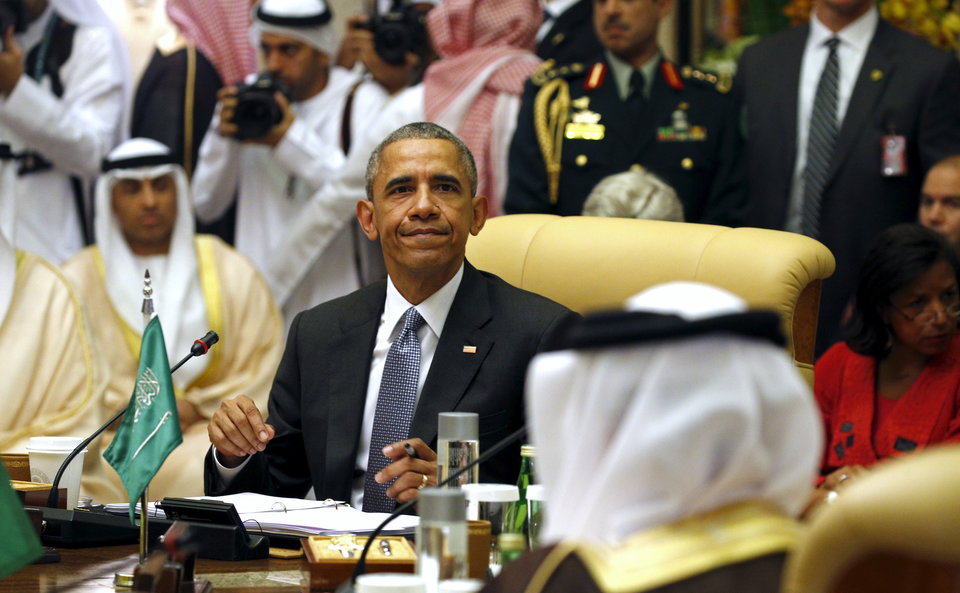This could be the last visit for President Barack Obama -as the U.S. President- meeting with the Custodian of the Two Holy Mosques King Salman bin Abdulaziz along with Gulf Cooperation Council (GCC) leaders. The summit signified the second chapter of the first Camp David meeting, which took place a year ago, when the U.S. President met with GCC leaders, prior to the signing of the nuclear deal with Iran.
The state-of-affairs shared by Saudi Arabia and Washington has not improved significantly, when addressing matters on Iran’s involvement in Syria, Iraq and Yemen which ultimately caused unprecedented regional volatility.
Within the year separating the Camp David summit and the Riyadh recent summit, the White House managed signing the nuclear deal with Iran and failed to provide a similar assurance to the other party; which is a measure to balance the dangerous step taken, from the Gulf’s perspective.
At the same time, Iran alongside its allies has not rested efforts to dominate over the region; especially as it exploited currently unstable countries and threatening GCC nations’ peace and security.
The current regional warfare – waged directly and indirectly- has left no room for the accord with Iranian plan put by GCC members and Washington. The nuclear deal has allowed the Islamic Revolutionary Guard Corps (IRGC) to sum up the ego and cross borders, fighting at unparalleled wars on the outside.
What was expected after last year’s U.S.-GCC Camp David’s summit was that the U.S. would eventually balance out the lifting of sanctions with a strict policy against Iran’s violations and plans of expansion threatening its neighbors. However, such a balance has not been realized.
Iran has won over relief from sanctions, delivery of its financial stocks, the striking of deals and has been brought into the negotiations concerning regional crises, in addition to the military operations it is running across three different frontiers.
Iran has also not been as much as threatened for its violations against U.N. Security Council’s decision prohibiting the arming of insurgents in Yemen; given that all of U.S., British, French and Australian naval facilities have apprehended Iranian cargo on its way to Yemen.
Gulf countries have committed to the agreement on the international accord at Camp David last year, as to demonstrate before the U.S. that they do not stand against the West’s reconciliation with Iran.
However Gulf countries are against Iran’s policy on spreading chaos and endorsing insurgencies across the region. Iran’s approach has not changed since it was laid down by its former Supreme Leader Ayatollah Khomeini, after clergymen took over rule of Iran in 1979. The current Iranian government largely employs the same method.
The aforementioned, evidently put a spoke in the wheel of Gulf Saudi –U.S. affairs.
Washington cannot open up doors to Iran allowing it to threaten regional countries and interests while asking the afflicted countries to settle silently.
Moreover, Obama’s term in presidency lasts till the end of 2015, which is not a short period measured in Middle Eastern state-of-affairs minutes, bearing in mind the accelerating dangerous events covering the region from Syria to Libya. A few months can hold grave significance.
During the months left, if Obama truly wishes to end his term both in sustaining his project with Iran and reserving the long-held special relationship with the Gulf countries, and Arabs in general; he must seek out a proper balance which neutralizes the defects caused by the nuclear deal’s aftermath.
Countries cannot help but sense that Iran is spreading its span of dominance over Syria, Iraq and Lebanon all in one step, and cannot stand still and watch Iran take over its northern bordering neighbors and spur anarchy against them in Yemen.
How could Obama strike a balance? Following through with his declarations, support removing the head of the Syrian regime and back the U.N. resolutions which the U.S. has already agreed on concerning empowering legitimacy in Yemen could be a place to start.
Would Obama actually do that after leaving Riyadh? There isn’t much hope to that, the president has not said a word and neither does his policy suggest such proceedings. It appears that Obama is betting on the sides to the conflict consuming each other and finally settling to some solution.
He no longer is enthusiastic on undertaking action, perhaps it is because he no longer sees strong reasons to the alliance with the GCC, and no longer believes that some countries are closer to the U.S. than others.
Leading from behind seems to be Obama’s favorite adopted policy, which he has employed since his rise to power seven years ago. Reality proves that his approach failed, noting that regional forces proved their capacity to endure for a longer period of time than expected.
Obama’s take on things also proved mistaken after observing the spreading chaos. Anarchy coming from al-Qaeda, ISIS and several other terrorist organizations threatens the whole world today. Pressuring Iran and confronting it would be enough to put an end to the crises in Syria, Iraq, Lebanon and Yemen; or perhaps would at least inhibit the largest of fights induced.
